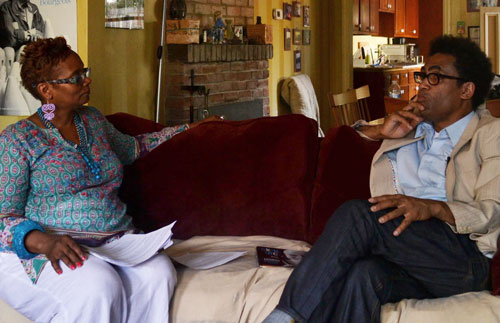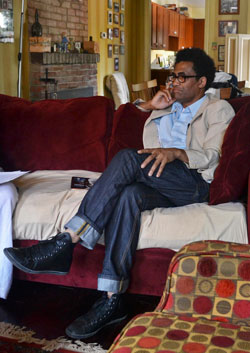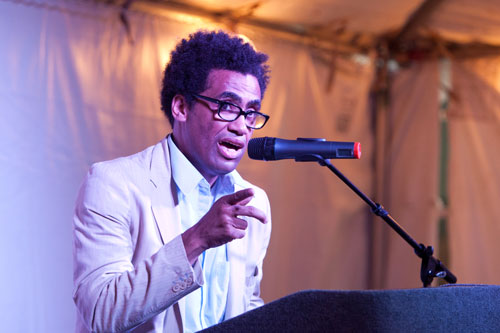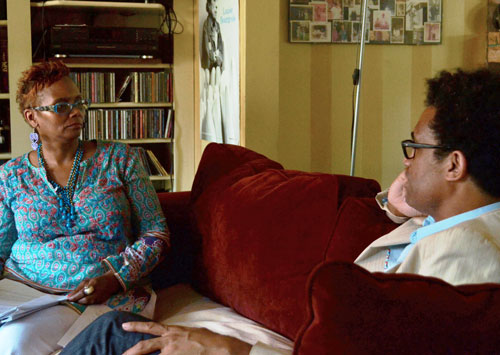Thomas Sayers Ellis: Keeping the Folk Tradition Alive
by Bonita Lee Penn / October 1, 2012 / No comments
On June 21st, City of Asylum/Pittsburgh co-hosted a reading with Cave Canem, an organization that is committed to cultivating the artistic and professional growth of African American poets. Among the many prominent poets who read this year was Thomas Sayers Ellis.
Ellis is the author of Skin Inc.: Identity Repair Poems, a collection that has been described as his “big, ambitious argument in sound and image for an America whose identity is in need of repair.” Ellis is also the author of the poetry collections The Maverick Room, The Good Junk, The Genuine Negro Hero, and Song On. He teaches at the Lesley University low-residency MFA program and is Assistant Professor of Creative Writing at Sarah Lawrence College.
While in Pittsburgh, Ellis spoke with Bonita Lee Penn, a Pittsburgh-based poet who runs a workshop for young poets and serves as the Editorial Manager of the Soul Pitt Writer’s Block, the literary section of The Soul Pitt, a community website for minorities in the Western Pennsylvania tri-state area.
In this interview Ellis talks about his personal relationship with the oral tradition, the founding of the Dark Room Collective, and the future of language and motion.
Do you feel that academic institutions that offer creative writing programs place the craft of the poem above the poem?
The craft and the poem should be one. In ceramics, when we make a bowl, we don’t separate the material from the shape or the function. The moment those things are divorced they become separate studies. What I try to do is use a vocabulary that considers poem and craft as one.
It’s like fixing a door: The door is hinged, the door swings, and the hinge is connected to the frame by something. You could consider the nuts and bolts the craft—the thing that holds it together—and you could consider the swing, the nuance, the poetry. The idea is to make a thing that opens and closes effortlessly.
What I try to teach is a way of walking and behaving in the poem that’s akin to your own reading.
Do you think that the education system provides the tools necessary for preserving individuality in art?
I think that if you teach students to inherit the language they will continue it in their own way, which is not what a lot of schools facilitate. Usually the students come in contact with the curriculum, the canon, and syllabi. Those things are great for herding them towards the same reservoir of knowledge, but at times they work against individuality.
When I was at a workshop in Chicago a couple years ago I asked one of the students how he chose a graduate school geared towards a black writer. He said there are none and that you just find one that you can work with. How did you pick your MFA program?
When it came time to pick a grad school I wanted to study with a black writer who was a part of the tradition, who honored the tradition and carried it around inside him.
I was disappointed when I found out that if you wanted to study with Toni Morrison you had to get into Princeton, and if you wanted to study with Michael Harper you had to go to Brown. I was lucky enough to get into Brown University and Michael Harper was the only black writer there, so I consumed him, and he consumed me, and I’m sure that was tiring for him.
Should the education system create more MFA programs for black poets?
Yes. Howard University, Spelman College, and Morehouse College should all have MFA programs. I’m hoping that this generation, or the one after, will challenge the model of MFA programs altogether, finding that way of life flat, fixed, finished, not organic. There are lots of ways to get what’s inside of you out of you, and the Socratic roundtable method might not be the answer for everyone.
In a 2010 interview you said that the bold period of black poetics did not last long enough for your taste. What were you talking about?
As a child I was influenced by the post-60s vibe. My parents weren’t educated people and there weren’t any books, so I came to reading and writing via the oral tradition, via soul music, and via my great-grandmother who was a Baptist preacher. Before I started to write I listened; that language and that music became my literature.
When I got to high school and college I noticed that what I was learning in workshops and reading in schools leaped over a certain kind of behavior that I expected from the oral tradition. In a writing class they taught restraint. The problem is that written textual rules are aimed at the organic mouth and separate what happens in the mind—the mouth and behavior—from the page, and it seemed to me that there needed to be some repair work done to put them back together.
For example: I was talking to a group of students today who didn’t really know about the treasure chest of Negro folklore—Tar Baby and Brer Rabbit, and “The Signifying Monkey.”
But this is what’s great about Toni Morrison; she knew about all of that and brought it to literature. All those things from our folklore, all our bad ways and loving ways, became tropes for characters. So I thought it was time for some identity recall. Skin Inc.: Identity Repair bridged the gap from what happened after the demise of the Black Arts movement to Rita Dove winning the Pulitzer Prize for Thomas and Beulah. There’s a wide gap of awards; we haven’t had a Nobel Prize-winner, though Gwendolyn Brooks should have won it years ago. In Skin Inc. I traveled through the tradition and boldly added my two cents to all the conversations I’ve heard. I didn’t want to privilege metaphor and simile the way that they always had been. It was an experiment, and maybe it worked, maybe it failed, but I was indeed passionate about it.
I read that you want to take the page to the stage and the stage to the page.
I only want to take the page to the stage and stage to page in a way that’s unlimited. The page and the stage are never really separate. We humans came along and made schools, -isms, styles, compartments, and departments. Poetry thinks we’re silly for fighting these little segregated battles. Poetry isn’t “page” and “stage.” But we do a funny thing: The moment the body becomes a part of it, the form of page becomes performance, and then class issues come into being. The academy protects form and ideas that are canonical or important by separating them from performance.
I think that it’s time that literature isn’t governed solely by certain types of intelligence because we’re leaving things out. We’re hurting because we don’t listen high and low.
You were the founder of the Darkroom Collective and the Darkroom Reading Series, groups made of other Black poets. I am part of the Madwomen in the Attic workshop, and they’re really good, but at times because of the cultural diversity within the group, I find the need to explain myself. How important are workshops for black writers?
When I went away to school in Boston I noticed that there weren’t that many black people attending workshops and readings, even though I knew there were black writers.
But then Amiri Baraka read at Brandeis University just after James Baldwin died. I don’t even remember the reading, but I do remember that Baraka said to us, “If you care about community, the gift that this man was given, and the gift that this man gave you, you’ll come to his funeral.”
The funeral was so moving that after we came home we decided to clean out our house—we had a rent-controlled Victorian in Central Square—and we made a list of writers we liked, and invited them to come read. That became the Darkroom Reading Series in 1989. The name came from a photographic dark room one of my roommates had upstairs.
Quincy Troupe was our first reader. After three years we ended up in The New Yorker, the Boston Review, and American Visions. Eventually the house was sold, and we got picked up by the Institute of Contemporary Art.
This reading series leapt us over the act of just submitting our poems and waiting. We got to know the people, and on occasion they would say things like “Oh, I heard about this opportunity, send your poems here.” We had a direct line, but that wouldn’t have mattered if on the off weekends we weren’t writing and workshopping.
Community is important to black, to blue, to green, to white. It happens when there’s encouragement around it, and often encouragement takes the form of other people doing things. Do you need any of this to be a writer? No. Do you need to publish to be a writer? No. Do you have to be black or have a reading series? No.
I’d never heard about Go-Go music until I interviewed a rap group from CMU, and they said the woman in the group, who was from D.C., did the Go-Go beats. I thought, “What the heck is that?” Then I read that you were doing a Go-Go book on “the lost art of D.C.”
Go-Go is a continuous percussive music. At the beginning, in the late 70s, it served as an information-giver to the community. D.C. has a percussive vibe, an old southern town vibe, and the Go-Go vibe came out of that.
In high school I was a Go-Go drummer and I played what we called the beat, or the pocket, but I had to go to college and that was the worst thing that could have happened. I thought I was going to be a Go-Go star, but nobody in my family had been to college, and I was like “Fuck, I gotta go to college.” But I’ve been documenting Go-Go since 1986. I was one of the photographers at Chuck Brown’s funeral, who was the godfather of Go-Go. I had interviewed him and I’ve been thinking about editing the book that you mentioned now that he’s dead. I had promised several younger Go-Go bands that I would come do portraits this summer, but the Go-Go book is almost done; it’s pictures and writing, it’s a Go-Go manifesto.
One of my favorite quotes is from Amiri Baraka who said, “The job of the artist is to uplift the consciousness of the community.” What do you think about that?
The problem is that “job” is a too small word. Still I do think that art and the imagination are conscious altering. I’m not as Marxist as Baraka, though he’s probably the most important black writer in my life. “Uplift the consciousness of the community?” Sure. There’s nothing wrong in that statement, but what is the notion of community? City, state, block, area? The ones who go to church together? Community can be found in many ways and is constantly shifting and changing. I think that the jury is still out on the way art is made, the effects of art, and what art can do. We haven’t seen all the things it can do.
We made a mistake in this world by practicing and teaching governance as a political act when art is really the political act. When I say art is a political act, I don’t mean you should go vote for an artist. I mean that the imagination is the most political tool. It can re-imagine society and effect change. To make a change you have to be able to imagine it first. Art is conscious change and it lifts the consciousness of the community, but we’re in a place in history where we still have to care for community, and Baraka is at that place.
Remember DuBois said that the problem of the twentieth century was a color line. We’re just leaving that. We think we’re civilized, but we really just stood up. There’s a long way to go. Especially when you remember that we’re still talking about race and class. I think Baraka is noble and right to look for ways to fight against capitalism, and art might be one of the remedies, but not solely by itself.
There used to be a lot of black literary journals. Do you think that there should be more? Would that be a benefit to black writers?
I can’t look at it as a packaged statement and say that if there were more it would be better. If you’ve got more, but they’re all similar, and they’re all coming from one class of people or one aesthetic, that’s a problem. I think the next literature somehow won’t be written. I don’t think that Book is over, but Book isn’t king anymore. There are lots of ways of communicating ideas, and I think that we may be looking for those, and the package might change. I’m not speaking about technology. I’m saying the literary magazine may have reached its height already, and its age.
I’m a poet now and can’t prevent the poems from coming. It’s like they’re writing me, and I’ve surrendered to that. I just go “Oh Poem! Leave me alone tonight! I’d like to go to the movies, Poem!” I think it would be nice if when they weren’t bothering me they could appear in the air in front of me.
Workshops and readings now have to take motion into account, and even the text on the page has to account for that. People will find a way to write and exchange ideas whether literary magazines come back or not. As for me, I’m ready to go blindly into the darkness, bump into a comma, get frustrated, scratch my head, get bored, get up, come back, sit down again, and bang the pencil against the page until we get the beat right.








